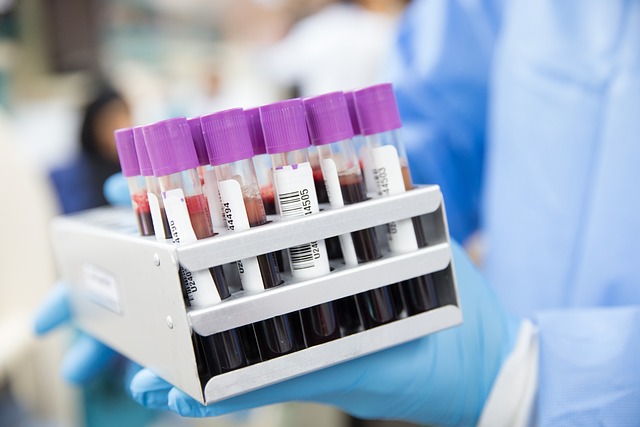Thyroid health is vital for overall well-being, and early detection in the UK relies on the standardized UK Standard Thyroid Blood Test (TSH, T3, T4). This test, available in a comprehensive kit, streamlines assessment by providing clear patient instructions for sample collection. Normal ranges are 0.4-4.0 mIU/L for TSH, 80-180 ng/dL for T3, and 5.5-12.0 mIU/L for T4; deviations indicate potential thyroid dysfunction requiring medical attention.
In the pursuit of optimal health, understanding thyroid function is paramount. For UK patients, access to comprehensive thyroid examination kits aligns with national standards for endocrine care. This guide delves into the intricacies of a thorough kit, detailing what tests are included and how to interpret results from the crucial UK Standard Thyroid Blood Test. Empowered by knowledge, individuals can actively manage their thyroid health.
- Understanding Thyroid Health and UK Standards
- What's Included in the Comprehensive Examination Kit?
- How to Use and Interpret Your Thyroid Blood Test Results
Understanding Thyroid Health and UK Standards
Thyroid health is a crucial aspect of overall well-being, and understanding its importance is key to early detection and management. The thyroid gland, located at the base of the neck, plays a vital role in regulating metabolism, growth, and development. Any imbalances or abnormalities can lead to various thyroid conditions, affecting energy levels, weight, and even mood.
In the UK, access to thyroid-related healthcare services is governed by established standards, ensuring patients receive accurate diagnoses and appropriate treatment. The UK Standard Thyroid Blood Test is a comprehensive assessment that includes measuring key hormones like T3, T4, and TSH. This test helps identify hypothyroidism, hyperthyroidism, and other thyroid disorders, allowing healthcare professionals to provide timely interventions and management strategies.
What's Included in the Comprehensive Examination Kit?
A comprehensive thyroid examination kit for UK patients is designed to provide a thorough assessment of thyroid function and health. Included in this kit is a range of essential components that enable accurate diagnosis and monitoring. The core element is the UK Standard Thyroid Blood Test, which measures key hormones such as T3, T4, and TSH (Thyroid-Stimulating Hormone).
Additionally, the kit may contain instructions for patients on how to properly collect samples at home, ensuring accuracy and reducing potential errors. It also includes a secure packaging system to maintain sample integrity during transit to the laboratory. These features collectively contribute to a seamless and reliable thyroid examination process, catering to the needs of UK healthcare providers and their patients.
How to Use and Interpret Your Thyroid Blood Test Results
When performing a UK standard thyroid blood test, it’s crucial to follow the recommended timing for sampling—preferably in the morning, before eating or drinking anything except water. This ensures accurate results as your body’s hormone levels are at their most stable during this time. After obtaining the sample, ensure it reaches the lab promptly; many labs offer same-day processing for faster results.
Interpreting your thyroid blood test results involves understanding the reference ranges provided by the laboratory. The key hormones to focus on are TSH (Thyroid Stimulating Hormone), T3 (Triiodothyronine), and T4 (Thyroxine). Normal levels of TSH typically range between 0.4 and 4.0 mIU/L, while T3 and T4 levels can vary slightly but generally fall within the ranges of 80-180 ng/dL for T3 and 5.5-12.0 mIU/L for T4. Deviations from these ranges may indicate thyroid dysfunction, requiring further medical evaluation and potential treatment adjustments.
A comprehensive thyroid examination kit is an invaluable tool for UK patients seeking to manage their thyroid health. By providing a detailed assessment, this kit aligns with UK standards for thyroid blood tests, enabling individuals to take an active role in understanding and optimizing their endocrine system. With easy-to-follow instructions, patients can interpret their results, fostering informed decision-making regarding their overall well-being.
